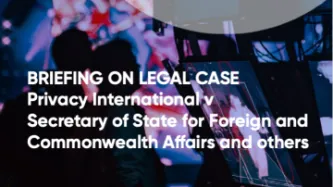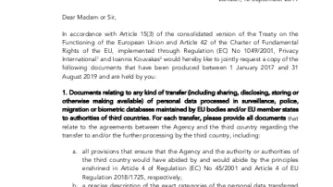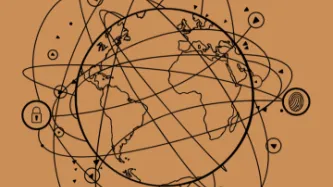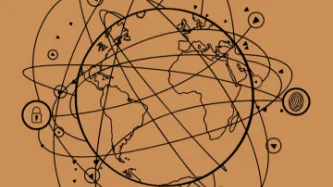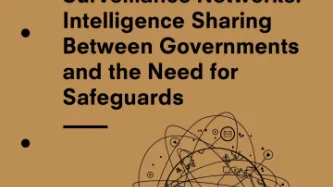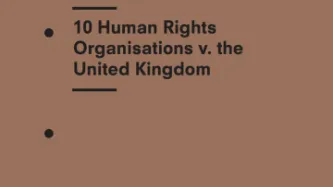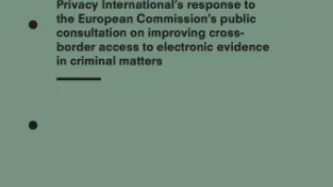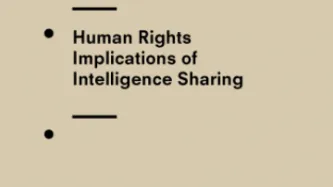Search
Content type: Report
First published in 2017, PI’s Guide to International Law and Surveillance is an attempt to collate relevant excerpts from these judgments and reports into a single principled guide that will be regularly updated. This is the fourth edition of the Guide. It has been updated it to reflect the most relevant legal developments until March 2024.The Guide aspires to be a handy reference tool for anyone engaging in campaigning, advocacy, and scholarly research, on these issues. The fourth…
Content type: Advocacy
Privacy International joined civil society efforts to call the South African Parliament not to approve the draft General Intelligence Laws Amendment Bill 2023 (GILAB), which was approved by the Cabinet and introduced in Parliament.
The Bill was proposed by the South African government, after the Constitutional Court found the Regulation of Interception of Communications Act of 2002 (RICA) unconstitutional on multiple grounds.
The draft Bill fails to meet the human rights standards on many…
Content type: Advocacy
Following our comments on the draft Treaty text, PI's intervention, during the fourth session, focused on the provisions of the draft Treaty that deal with procedural measures and law enforcement. Specifically, we emphasised that the investigative measures contained in the draft Treaty should only be limited to serious offences only that are established by the Treaty. In addition, we urged delegates to remove a provision contained in the draft Treaty text that would allow authorities to exploit…
Content type: Long Read
The same day that the United Nations General Assembly convened an emergency special session to respond to Russia’s full-scale invasion of Ukraine in early March, a very different set of negotiations was underway in another U.N. conference room. More than two years after its establishment, the Ad Hoc Committee to Elaborate a Comprehensive International Convention on Countering the Use of Information and Communication Technologies for Criminal Purposes (hereinafter the Ad Hoc Committee) held its…
Content type: News & Analysis
After almost 20 years of presence of the Allied Forces in Afghanistan, the United States and the Taliban signed an agreement in February 2020 on the withdrawal of international forces from Afghanistan by May 2021. A few weeks before the final US troops were due to leave Afghanistan, the Taliban had already taken control of various main cities. They took over the capital, Kabul, on 15 August 2021, and on the same day the President of Afghanistan left the country.
As seen before with regime…
Content type: Long Read
Additionally, in January 2020 Privacy International and UK-based NGO Liberty filed a new claim against MI5 and the Secretary of State for the Home Department in the Investigatory Powers Tribunal (the “Ungoverned Spaces Case”, this time, the case sought to hold MI5 and the SSHD accountable for systemic, long-term failures in the way they handle and retain millions of people’s personal data. As part of this claim, PI requested that the IPT re-opens parts of the original BPD/BCD. This aspect of…
Content type: News & Analysis
What happened
On 22 July 2021, the Investigatory Powers Tribunal (IPT) issued a declaration on our challenge to the UK bulk communications regime finding that section 94 of the Telecommunications Act 1984 (since repealed by the Investigatory Powers Act 2016) was incompatible with EU law human rights standards. The result of the judgment is that a decade’s worth of secret data capture has been held to be unlawful. The unlawfulness would have remained a secret but for PI’s work.
You…
Content type: Long Read
The Grand Chamber of the European Court of Human Rights ruled that the UK government’s historical mass interception program violates the rights to privacy and freedom of expression. The Court held that the program “did not contain sufficient “end-to-end” safeguards to provide adequate and effective guarantees against arbitrariness and the risk of abuse.” As a result the Court ruled that UK law "did not meet the “quality of law” requirement and was therefore incapable of keeping the “…
Content type: Long Read
On 25 May 2021, the European Court of Human Rights issued its judgment in Big Brother Watch & Others v. the UK. Below, we answer some of the main questions relating to the case.
After our initial reaction, below we answer some of the main questions relating to the case.
NOTE: This post reflects our initial reaction to the judgment and may be updated.
What’s the ruling all about?
In a nutshell, one of the world’s most important courts, the Grand Chamber of the European Court of Human…
Content type: Video
This case was made possible because of Edward Snowden’s disclosures in 2013, and through the combined work of Big Brother Watch, American Civil Liberties Union, Amnesty International, Bytes for All, Canadian Civil Liberties Association, Egyptian Initiative for Personal Rights, Hungarian Civil Liberties Union, Irish Council for Civil Liberties, Legal Resources Centre and Liberty.
Content type: Report
Privacy International has released a report summarising the result of its research into the databases and surveillance tools used by authorities across the UK’s borders, immigration, and citizenship system.
The report uses procurement, contractual, and other open-source data and aims to inform the work of civil society organisations and increase understanding of a vast yet highly opaque system upon which millions of people rely.
It also describes and maps…
Content type: Advocacy
Identification systems across the world increasingly rely on biometric data. In the context of border management, security and law enforcement, biometric data can play an important role in supporting the investigation and prevention of acts of terrorism.
This Briefing aims to map out some of the implications of the adoption of identification systems based on biometrics.
Content type: Case Study
The prohibition against torture is absolute. There are no exceptional circumstances whatsoever which can be used to justify torture.
And yet, torture is still being carried out by state officials around the world, driven by states’ ability to surveil dissidents, and intercept their communications.
In 2007, French technology firm Amesys (a subsidiary of Bull) supplied sophisticated communications surveillance systems to the Libyan intelligence services. The systems allegedly permitted the…
Content type: Report
In September 2019, Privacy International filed 10 access to documents requests to EU bodies regarding the transfer of surveillance capabilities to non-EU countries. The requests seek documents providing information on the transfer of personal data, surveillance technology, training, financing, and legislation to non-EU countries. The requests were submitted to:
Frontex
Europol
The European Union Agency for Law Enforcement Training
The Directorate-General for Economic and…
Content type: News & Analysis
Photo: The European Union
“Border Externalisation”, the transfer of border controls to foreign countries, has in the last few years become the main instrument through which the European Union seeks to stop migratory flows to Europe. Similar to the strategy being implemented under Trump’s administration, it relies on utilising modern technology, training, and equipping authorities in third countries to export the border far beyond its shores.
It is enabled by the adoption…
Content type: News & Analysis
Picture Credit: US AID
US President Trump has been cutting aid to Central America, including a surprise cut of approximately $500m in aid to the “Northern Triangle” countries of El Salvador, Guatemala, and Honduras, apparently as punishment for “doing absolutely nothing” to prevent emigration to the US.
What remains of the funds is largely and deliberately being repurposed for spending on the US’s own security interests: indeed, one area which his…
Content type: News & Analysis
Foto: US AID
El presidente estadounidense Trump ha estado recortando la ayuda a Centroamérica, incluyendo un recorte sorpresivo de aproximadamente 500 millones de dólares a los países del “Triángulo del Norte” (El Salvador, Guatemala y Honduras), al parecer como castigo por “no haber hecho absolutamente nada” para impedir la emigración hacia los Estados Unidos.
Los fondos restantes están siendo reorientados,en su gran mayoría y deliberadamente, al gasto para…
Content type: Long Read
Imagine that every time you want to attend a march, religious event, political meeting, protest, or public rally, you must share deeply personal information with police and intelligence agencies, even when they have no reason to suspect you of wrongdoing.
First, you need to go to the police to register; have your photo taken for a biometric database; share the contacts of your family, friends, and colleagues; disclose your finances, health records, lifestyle choices, relationship status, and…
Content type: Advocacy
In October 2018, Privacy International submitted to the public consultation on the “Consolidated Guidance to Intelligence Officers and Service Personnel on the Detention and Interviewing of Detainees Overseas, and on the Passing and Receipt of Intelligence Relating to Detainees” (“Consolidated Guidance”) held by the Investigatory Powers Commissioner’s Office (“IPCO”).
Privacy International’s submission addresses the portions of the Consolidated Guidance on “the Passing and…
Content type: News & Analysis
Data sharing among states is gaining prominence, particularly in light of the need to coordinate counter-terrorism activities across borders. The President of the European Commission put it in stark terms just a couple of months ago: “Terrorists know no borders. We cannot allow ourselves to become unwitting accomplices because of our inability to cooperate.” And several UN Security Council resolutions have emphasized the need for international cooperation in counter-terrorism.
Privacy…
Content type: Long Read
Privacy International’s new report shows how countries with powerful security agencies are training, equipping, and directly financing foreign surveillance agencies. Driven by advances in technology, increased surveillance is both powered by and empowering rising authoritarianism globally, as well as attacks on democracy, peoples’ rights, and the rule of law.To ensure that surveillance powers used by governments are used to protect rather than endanger people, it is essential that the public,…
Content type: Long Read
A major new report published today by Privacy International has identified alarming weaknesses in the oversight arrangements that are supposed to govern the sharing of intelligence between state intelligence agencies.
'Secret Global Surveillance Networks: Intelligence Sharing Between Governments and the Need for Safeguards' is based on an international collaborative investigation carried out by 40 NGOs in 42 countries.
Previously undisclosed documents obtained by PI via litigation in the…
Content type: Report
‘Secret Global Surveillance Networks’ is a major PI report, based on an unprecedented international collaborative investigation carried out by 40 NGOs in 42 countries.
Our research shows that, globally, the sharing of intelligence is alarmingly under-regulated, opening the door to human rights abuses. Intelligence sharing has evolved dramatically with the rise of new surveillance technologies, enabling governments to collect, store, and share vast troves of personal information, including data…
Content type: News & Analysis
For further information on timeline and case history, read this briefing.
Arguments
The argument were based on the written submissions of the parties. The oral statements summarised key points in these submissions.
The submissions can be found on PI’s website under Legal Action. In terms of today’s proceedings (these are now available through webcast)
Counsel for the UK Government, James Eadie QC started off proceedings, his opening arguments were: 1) The issues are of…
Content type: Press release
The European Court of Human Rights will hear a landmark case on surveillance tomorrow (7 November) as part of a challenge to the lawfulness of the UK’s surveillance laws and its intelligence agencies’ mass surveillance practices.
See the attached briefing for case background and historical information.
The case, described by campaigners as a “watershed moment for people’s privacy and freedom of expression across the world”, is being brought by Amnesty International, Liberty, Privacy…
Content type: Press release
Privacy International has filed a federal lawsuit seeking to compel disclosure of records relating to a 1946 surveillance agreement between the US, UK, Australia, Canada and New Zealand, known as the “Five Eyes alliance”.* We are represented by Yale Law School’s Media Freedom and Information Access Clinic (MFIA). The most recent publicly available version of the Five Eyes surveillance agreement dates from 1955. Our complaint was filed before the U.S. District Court for the District of Columbia…
Content type: Advocacy
On 23 October 2017, Privacy International contributed to the public consultation of the European Commission on improving cross border access to electronic evidence for criminal investigation. The consultation raises important questions, particularly in relation to preserving human rights protection and safeguards as national police forces seek digital evidence in other jurisdictions.
The EU is not the only inter-governmental organisation seeking to address the complex jurisdictional…
Content type: Press release
Privacy International, in partnership with 30+ national human rights organisations, has today written to national intelligence oversight bodies in over 40 countries seeking information on the intelligence sharing activities of their governments.
Countries may use secret intelligence sharing arrangements to circumvent international and domestic rules on direct surveillance. These arrangements can also lead to the exchange of information that can facilitate human rights abuses,…
Content type: Advocacy
On 13 September 2017, Privacy International, in partnership with 30+ national human rights organisations, launched an international campaign for greater transparency around secretive intelligence sharing activities between governments. As part of this campaign, PI wrote to national intelligence oversight bodies in over 40 countries seeking information about the intelligence sharing activities of their governments. PI has created an interactive map which illustrates the countries…





